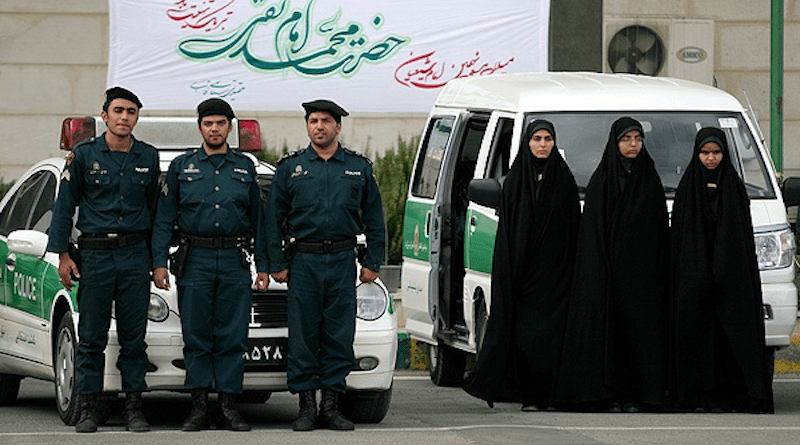Iran: Ambiguity Around Disbanding The Morality Police – Analysis
By Observer Research Foundation
By Farheen Nahvi
In a conference on Saturday, 3 December, the Attorney General of Iran Mohammad Jafar Montazeri stated, “The morality police have nothing to do with the judiciary, and have been shut down from where they were set up.” while answering a question regarding the controversial morality police (the guidance patrol or gasht-e-ershad). This comes against the backdrop of the ongoing anti-government protests that were sparked by the death of a 22-year-old Iranian woman who was allegedly killed by the morality police.
Montazeri’s statements were immediately picked up by international media outlets, like the New York Times, to mean that the Iranian government had disbanded the force and was conceding to the demands of revoking the modesty laws. But there has been no official announcement from law enforcement or the clerical leaders regarding either. The state media outlets like Al-Alam refuted any claims of disbandment, chalking it up to a ‘misinterpretation’ of Montazeri’s words, and Iranian activists such as Masih Alinejed have called this a propaganda move by the State unwittingly supported by international media.
The significance of abolishing the morality police
Demonstrations have been sweeping the country since mid-September, as Iranians from across gender and ethnic lines have come together in an unprecedented show of anti-regime sentiment. From open defiance of the modesty laws on the streets of Iran, protesters chanting anti-regime songs and coordinating demonstrations, to merchants and shopkeepers calling a nationwide shutdown, and following through- Iranians show no sign of letting up. However, the state has treated it only as a disturbance, calling the protesters ‘rioters’ and blaming foreign influence for the unrest. There has been a lack of acknowledgement towards the protests as raising legitimate grievances, and any action taken by the State so far has been punitive. Given this background, the possibility of abolishing the mandate of the morality police or easing the modesty laws would be a novel reaction by the State, bound to garner international attention.
Outrage over the policing of women’s bodies, particularly by the morality police, has been the catalyst for the storm that has taken over Iran. While the matter has coalesced into broader anti-establishment rhetoric, any action toward the mandatory hijab or dissolving the morality police would serve a huge symbolic purpose as well. Moreover, conceding their authority on this subject opens them up to further loss of power, and raises questions about Iran’s projected cultural identity. So the stakes are high for the State, but the reward of follow-through might not be.
The US Secretary of State Anthony Blinken has said that disbanding the morality police could be a positive thing, but much of the Iranian population does not seem to agree. After news of Montazeri’s comments spread, while some celebrated it as a victory, many Iranians expressed indifference to the move [if carried out]. For a population who has adopted regime change as its goal, they have come forward to say, even major concessions like these are not going to be enough. A certain segment of the population can be expected to consider this enough of a compromise, but as the movement is no longer only about the rights of women, it goes much deeper. Thus, this move, if taken by the state, is very likely to embolden the protesters.
Current scenario
The State’s ambiguous follow-up to Montazeri’s remark has further obscured the situation. No official statement refuting the claim has been made yet, neither have they expressed any follow-through plans. Nonetheless, some form of adjustment seems underway. The Ayatollah has called for the Supreme Council to observe Iran’s cultural weaknesses and revolutionise the country’s cultural structure; whether that means stricter control or easing up remains unclear. On a visit to Serbia, Iranian Foreign Minister Hossein Amir-Abdollahian neither denied nor confirmed Montazeri’s comment when prompted, rather insisted that “everything is moving well within the framework of democracy”. Sanam Vakil, Deputy Director of the Middle East and North Africa program at Chatham House, speculated that this could be a ‘test run’ by the State, to gauge how the move, in effect, would be received. The longer the conflict drags out, considerations of international pressure, long-term internal instability, and a weakening economy can be pushing the state towards a dialogue.
Another explanation is that the State is capitalising on the ambiguity around Montazeri’s remarks to ease some of the international and domestic pressure, making it seem like dialogue and compromise are on the table. But as activists and scholars such as Sanam Vakil have pointed out, abolishing the morality police does not necessarily mean that state policing of women’s bodies will be over. Just as the Basij— paramilitary volunteer militia—were absorbed into different aspects of Iranian administration and law enforcement after the Iran-Iraq war, the current guidance patrol can also be dispersed in a way that makes it appear that change is underway, whereas the modesty laws remain intact or enforced in other ways; socially through the female agents of the regime, for example, or under a new association. In his comments, Montazeri went on to say that “the judiciary will continue to watch over behavioural actions in the society,” indicating that it was not a matter to be let up easily.
Whatever the reason may be for the State’s ambiguity, it has started a conversation about which way Iran is headed in 2023: Compromise or escalation? If they opt for the former, it’s easily an explicit appeasement of the protesters; they would be acknowledging their legitimacy and lending them more leverage for future negotiations. If the State chooses to remain on its current path, then it’s a matter of waiting to see which side tires first. Iran is at a crossroad; the regime’s next steps in the midst of this chaos will be very telling of their position and will shape the movement for some time to come.

